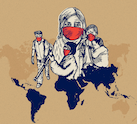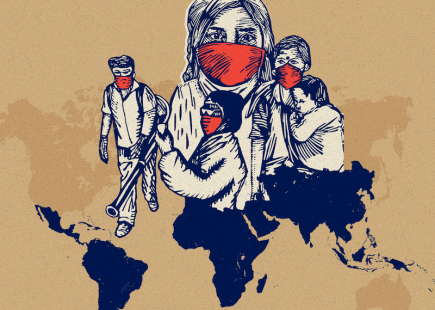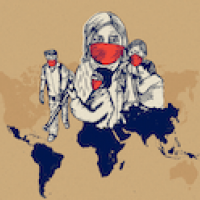This pandemic health crisis exposes the injustices of the global economic order. It must be a turning point towards creating the systems, structures and policies that can always protect those who are marginalised and allow everyone to live with dignity.


This analysis is a result of a collective discussion by TNI staff on the many dimensions of the COVID-19 pandemic drawing on the wisdom of many allies and friends. We hope it helps join some of the dots of this complex and still unfolding health emergency and supports the movements fighting to protect the most marginalised and to build a more just world.
This pandemic health crisis impacts a world already in crisis. It will have a disproportionate impact on the most vulnerable in our society and particularly in the Global South unless we mobilise and demand a just response to the pandemic. It is a wake-up call that the current capitalist economic system is not fit to protect the health of us as individuals or as societies. We must learn the lessons to defeat COVID-19, address the multiple crises we face―from accelerating inequality to the climate crisis―and build the just sustainable society we all desire.
The pandemic is unfolding in a world that is deeply unequal and already facing a multi-dimensional social and environmental crisis. Billions of people are already in highly precarious conditions because of the unjust global economy and therefore have neither the good health nor the economic possibilities to deal with either the virus or the wider economic and social disruptions that have resulted. For the majority of people in the Global South, this pandemic is likely to be particularly devastating given the ongoing legacies of colonialism, decades of debt and structural adjustment and unjust trade relations. This legacy has left health and social systems drastically underfunded, weakened and privatised and even less equipped than the overstretched health systems in the Global North to cope with a pandemic. We therefore must fight to ensure that every public policy today is directed towards supporting the most vulnerable and marginalised rather than just further rewarding the wealthy and powerful.
These could include immediate measures such as:
- Bailing out those losing jobs and income rather than bailing out industry.
- Taking over hotels, private hospitals, corporations that provide luxury services and purposing them to serve critical social needs.
- Preventing pharmaceutical giants from profiteering from drugs and medical devices needed during the pandemic.
- Conditioning any support to business to improved working conditions, practices, labour rights, environmental practices, increased worker participation and climate action.
- Prioritising public support and health services for homeless and marginalised communities, especially communities who have long endured criminalisation and exclusion, such as people who use drugs, sex workers, and undocumented migrants.
- Dignified living wages for all those on the frontlines of responding to the crisis - healthworkers, careworkers, sanitation workers, cleaners and the peasants/farmers, agricultural workers, fisherfolks who continue to produce our food.
- Redirecting resources from military spending and corporate subsidies towards meeting critical social and public health needs.
- Support for local and territorial food systems based on guaranteed land access, agroecology practices, food sovereignty and the production of healthy food.
- Ending detention and criminalisation of refugees and militarising of borders, focusing border controls on public health needs rather than repression.
- Urgent emergency measures to protect the health and human rights of vulnerable peoples including refugees, stranded migrant workers and internally displaced people.
- Supporting small businesses who are struggling to survive because of the crisis rather than the giant platform corporations such as Amazon who are already profiting.
- Urgent amnesty for political prisoners and non-violent offenders including people facing charges linked to illicit substances, to reduce disastrous impacts of the virus in prison populations.
Globally, this should include among others:
- Ending all economic sanctions that disproportionately affect poor people in countries like Iran and Venezuela.
- Cancellation of debts so that countries can redirect resources towards addressing the health crisis.
- Increased aid (grants rather than loans and without neoliberal conditionalities) for countries in the Global South on the frontline of the pandemic.
- Suspension of ISDS and other unjust trade measures that impose a financial burden and undermine countries’ capacity to prioritise public needs.
- Prohibition of patents and intellectual property rights for vaccines/drugs.
COVID-19 has exposed the massive vulnerabilities and injustices of the global capitalist system. It is critical that we understand these in order to prevent future pandemics and to learn how we can address other future crises, such as the climate crisis. COVID-19 exposes:
- a dangerously unequal world where millions are made particularly vulnerable based on their class, race or gender and an unjust global economic order where countries in the global South are ill-prepared to deal with pandemics.
- a capitalist industrial agriculture whose practices, including ever-increasing infringement on forest and other vulnerable ecosystems, have led to the arrival of ever more dangerous pathogens into human environments.
- a global supply chain predicated on maximising corporate profits rather than ensuring secure and resilient provision of essential goods.
- a very weak and shredded social safety net unable to support those, such as people with disabilities, affected by the disruptions of the pandemic.
- a crisis of precarity as billions without decent or formal work, for example in the so-called gig economy in the North and informal economy in the South, are left with no income and almost no safety net as customers disappear.
- a crisis of homelessness, where millions are threatened with loss of services and are at risk due to chronic health conditions.
- a health system that has been systematically weakened by austerity and privatisation, where health is not accessible to all, and where workers are gendered and racialised.
- a pharmaceutical industry that, driven by profits, has failed to invest sufficiently in vaccines and drugs to treat and prevent viruses.
- social isolation caused by neoliberalism that means that many people face this pandemic alone and without existing systems of social support.
Every crisis has those who seek to profit from it - and we must be vigilant to expose them and prevent their capitalising from this social crisis.
In particular, we must stand against the corporations that seek to profit, such as the pharmaceutical giants and private health service providers.
We must also stand against the reactionary racists and politicians that are using this moment to blame the Chinese, migrants and other ethnic minorities and to enact reactionary, xenophobic agendas that deprive people of their human rights.
Finally, we must not let this moment normalise the use of surveillance, military actions or authoritarian measures that undermine freedom and democracy. Surveillance and restrictions on movement must be combined with mechanisms of democratic accountability to independently assess whether it’s necessary and to ensure it is repealed when possible. Military involvement should be strictly under civilian medical and public health control with military resources and equipment diverted to public health needs. Any collection of personal data in an environment of unprecedented coercive state measures should be limited, temporary and strictly tied to health needs.
Various restrictive emergency measures being enacted right now may be appropriate as short-term responses to a public health emergency, but must not be allowed to become the new norm after the immediate crisis is under control.
COVID-19 shows that neoliberalism has led far too many to accept the dogma that there is no alternative, depriving us of key tools and policies needed to confront injustice and today’s systemic crises. COVID-19 has shown that dramatic policies are both needed and can be implemented in the face of a crisis. The fact that states have dramatically enacted policies considered politically impossible within hours shows it is entirely possible to address the climate crisis with bold and ambitious policies by 2030 as science demands. They are also going to be absolutely necessary to protect people’s livelihoods in the face of an economic crisis that will result from this pandemic.
Various policies and practices already enacted show our potential to address myriad crises we face today:
- Guaranteeing income and insurance shows we can have a stronger social safety net.
- Stopping evictions and cut-offs from key utilities shows how we can uphold basic human rights to water and other public services.
- Instructing companies to produce ventilators, and the efforts of entrepreneurial, independent, and DIY operators to modify and adapt existing technologies to save lives, points to the possibility of a green industrial revolution and the possibility of new intellectual property regimes that create technology and knowledge for the public good, rather than private profit.
- Spain’s temporary takeover of private health care providers demonstrates that publicly- controlled and universal health care is both ethical and rational.
- Solidarity shown by Chinese and Cuban doctors offering help to Italian doctors shows the power of transnational solidarity compared to the efforts of Trump to secure the vaccine for Americans only.
- Local and agroecological food providers and cooperatives in France and Spain offering solidarity food deliveries for those who can’t leave their house demonstrates the ability of territorial food systems to adapt and help care for those most in need.
We must remember that despite the scale and impact of this particular emergency, there are many existing health crises that never receive sufficient attention or a priority. TB kills 1.5 million people annually in Global South. More than 800,000 people die from lack of clean water and sanitation each year. Around the world at least 137 women are killed by a member of their family each day. We must dedicate the same level of commitment to tackling these ongoing social and public health crises.
COVID-19 also shows that despite decades of neoliberalism, peoples’ inherent sense of solidarity and compassion is very much alive. The millions of people worldwide setting up mutual aid groups, finding out ways to support their neighbours, meeting online to pressure for public policies for the most vulnerable show that a different world is indeed possible.
Let’s make this moment and experience of solidarity a permanent one - creating the systems, structures and policies that can always protect those who are marginalised and allow everyone to live with dignity.
Solidarity is the cure. Justice is the vaccine.
لقراءة المقال بالعربية:
